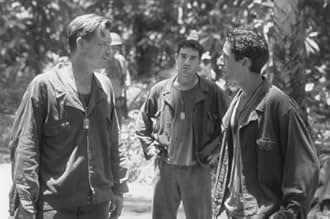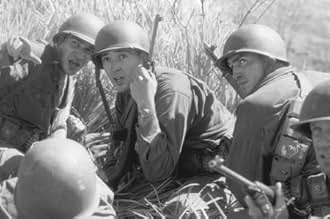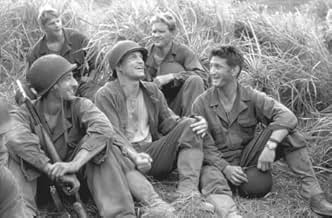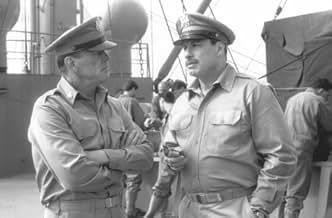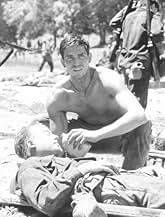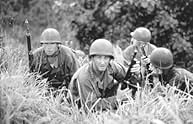द्वितीय विश्व युद्ध के दौरान ग्वाडलकैनाल में संघर्ष पर ध्यान केंद्रित करते हुए, जेम्स जोन्स के आत्मकथात्मक 1962 के उपन्यास का रूपांतरण.द्वितीय विश्व युद्ध के दौरान ग्वाडलकैनाल में संघर्ष पर ध्यान केंद्रित करते हुए, जेम्स जोन्स के आत्मकथात्मक 1962 के उपन्यास का रूपांतरण.द्वितीय विश्व युद्ध के दौरान ग्वाडलकैनाल में संघर्ष पर ध्यान केंद्रित करते हुए, जेम्स जोन्स के आत्मकथात्मक 1962 के उपन्यास का रूपांतरण.
- 7 ऑस्कर के लिए नामांकित
- 23 जीत और कुल 47 नामांकन
- Witt's Mother
- (as Penny Allen)
- Melanesian Villager
- (as Benjamin)
फ़ीचर्ड समीक्षाएं
Saving Private Ryan was significant in that it visually depicted war in a realistic, gritty way. The Thin Red Line's focus is more philosophical. It is about the contradiction between the beauty of nature and the destructive nature of men. The movie cuts continuously between the external struggle of American GIs fighting to take a crucial hill from Japanese occupation on Guadalcanal - and more importantly, the internal chaos of war as every man tries to come to his own terms about matters such as morals, death, God, and love.
Unlike in Saving Private Ryan, there is nothing patriotic about this movie. In fact, there probably has never been a more anti-war film. The fighting men here are disillusioned, lost, and frightened. They don't fight for their country or "democracy" - they fight because they have to. The only priorities are survival, and - for the more humane - caring for their comrades. Renowned composer Hans Zimmer - who won an Oscar nomination for his work-captures the grim mood perfectly and allows us to hear the men's thoughts.
The characters are portrayed by a strong ensemble cast. Acting is uniformly excellent, especially Nick Nolte as Colonel Tall, who is the unfeeling commander of the ground offensive on Guadalcanal. Thoroughly unlikable, he is the closest thing to a villain in the movie. After studying war for an untold number of years, Tall sees Guadalcanal as his chance to prove himself and move up in the ranks - the men are only a tool to accomplish this goal and expendable. In one crucial scene, he orders a captain (played by Elias Koteas, in another outstanding role) to lead his men to a frontal assault against a Japanese controlled hill. When the captain suggests a more logical alternative, the colonel screams: "You are not gonna take your men around in the jungle to avoid a goddamn fight!" To this, the captain replies, `I've lived with these men, sir, for two and a half years and I will not order them all to their deaths.' Later, when the hill is taken, he is dismissed of his duties as Tall sees him as a threat to the successful achievement of his goal. Certainly, not every commander must have been that coldhearted and selfish, but surely some were, though not necessarily to that extreme.
While the acting is very good, much of the cast is relatively unknown and it can initially be hard to distinguish the characters from each other as they may appear to be very similar. They are all about the same age, have dirt smeared over their faces, and wear helmets and the same military garb. Also, the stars in this movie have very small roles. George Clooney and John Travolta are credited with starring roles while really little more than extras - clearly for marketing purposes. You will not see more than two minutes of each.
One of the main themes of the movie is the contrast between nature and men's destructiveness in war. The director, Terrence Malick, hired cinematographer John Toll to capture this on camera, and towards achieving that goal they couldn't have been more successful. The almost surreal scenery is nothing short of stunning and has the same visual impact as any special effect. The beauty of nature is always present, even when it is a setting for battle of destruction, and death.
Though the battle scenes fall short of the frightening realism in Saving Private Ryan, they are heads and soldiers above every previous attempt. One truly gets the sense that war is a chaotic, often hopeless environment where it is only a matter of luck whether you survive or get killed.
`How did we lose the good that was given us? Or let it slip away? Scatter it carelessly ... trade it for what has no worth?' The film is filled with such poetic questions as to which there are no real answers. This is definitely not a party movie. There isn't anything uplifting about it - it is downright depressing. Asides from entertainment value, however, this is a film that makes you think.
The company is not made up of conscripts but regular soldiers. Some of them have been in the Army more than 10 years. Some of them however have never seen real action before and this is a hot and uncomfortable location, despite the lovely tropical scenery. Some crack up, some die, some do heroic deeds. Their leaders are not particularly admirable; one is quite happy to get his men killed if he can come out of the action looking good.
Out of sight for most of the film are the Melanesian inhabitants, the Solomon Islanders, who are carrying on living as best they can while the war rages around them. Their serenity is in sharp contrast to the frenetic military activity. Of course, there is nowhere for them to go.
There is some action excitingly filmed but as in real wars much of the time is spent preparing and waiting. Personal stories unfold but at the end it is survival that matters.
The lighting and photography is quite superb, the lighting in particular fitting the mood perfectly. Filming was not actually on Guadalcanal but near Port Douglas in Northern Queensland where there is similar tropical rainforest and fauna but with much easier logistics. It took ages apparently but seems more than worth the effort.
This is probably one of the four or five greatest war films ever made, right up there with "All Quiet on the Western Front, " "Paths of Glory," "Bridge on the River Kwai" and "The Longest Day." Never has a movie better portrayed what it's like to be a frontline soldier.
Terrence Malick has the reputation of being an eccentric, difficult director - Kubrick without the fear of flying. Yet this is not a particularly unconventional movie - it's just that everything hangs together - the story, dialogue, performances, photography and settings. On thing is clear - this is a better interpretation of James Jones' novel than the 1964 version.
This story about the Guadalcanal campaign during WW2, based on the James Jones novel, weaves the lives of many characters together seemlessly, creating a philosophical/emotional experience of war. It's not just about war. It's about love, faith in yourself and others, friendship, humanity, morality and also works as a startling indictment of man's conflict with nature. The amazing opening sequence, sets up a tranquility as the character Witt, finds peace on a secluded island among the natives, a peace which is shattered by the war.
What follows is not a mindless battle-after-battle onslaught of pyrotechnics, smoke, dust and blood, but a thought-provoking, visually and verbally poetic analysis of war and humanity. In my opinion it is the greatest war film since Apocalypse now, which I believe bears more flaws than this. It's not an Us-and-Them war story about the glory of the USA defeating the evil Japs. It sticks close with the characters, as we hear the thoughts, their hopes, their fears, leading to a moving experience.
This film was released a few months after Saving Private Ryan and unfortunately did not experience the same attention that the latter film did. Ryan was an excellent film, but to offer a comparison, The Thin Red LIne treads where Ryan didn't dare. Ryan sat in the safe territory of Good vs Evil with a bit of Futility of War and a lot of American Patriotism. It seemed to be more about America at some points than about war. The Thin Red Line is about war, the people involved and the destruction it creates for the mind, the soul and for nature. It does not deviate from this to make simple contrasts and offer easy binary oppositions.
In fact, TTRL is not an easy film. Gasp, it even tries to make you think. Though the title is not really explained in the film, I believe it is implied, and could have many meanings - the line between sanity and insanity, morality and immorality, love and hate, companionship and loneliness, nature and man, war and peace. While the characters share their thoughts, deeply poetic as they are, the meaning is not thrown in your face and neither is the answer to the questions raised. In this way it is the most thought-provoking war film I've ever seen and one of the best films of all time in my book. Top ten easily.
Now to my whinge. I think TTRL was shunned unmercifully at the 1999 Oscars. Shakespeare in Love beat two brilliant films - TTRL and Elizabeth - to get that oscar, and don't get me started on Gwyneth's award. This is the best film of 1998/9, in line with Elizabeth. It's unfortunate that the two, thoug h greatly revered, did not achieve the success and attention they deserved.
Don't be afraid by its length, it's a beautiful journey, full of rich colour, sound and the reward is a deeply moving human experience, unlike any other that the past decade has offered.
about the oscars, i only watched the film after its surprise nomination for best picture. i had seen the competition already, and it was time to check out the fifth nominee. i went to the theatre myself, and came out three hours later, went home, and i cried. not only because i was disturbed, but i loved every single character in the film. i wanted to be there for them, cry with them, fight their battle. many people who have watched the film have said the same thing to me.
the Thin Red Line is sometimes painful to watch, but only because of its realistic juxtaposition of humanity, philosophy, and the terror of war. the film does not delve into any historical fact about Guadalcanal, except that the battle itself was terrifying (as is any battle). the characters introduce themselves through voice-over narration, which accompanies much of the action. and speaking of action, there is not much in the film. more images. images of war and the lives these soldiers left behind. this was Terence Malick's intent, of course, and many people were insulted and thought it was his own pretentious self getting the best of him. "boy he's a genius.. must he show it??" sometimes it is a little pretentious, but the film would've been "just another WWII film" if it was out of Malick's hands.
i can not understand why Sean Penn is billed as the top actor or the main character of this film. he was there a lot, but the film is carried by Jim Caviezel as the beautiful and ethereal private Witt. words can not describe this performance. with as few lines as he had, Caviezel portrays the symbolic soul of Witt, and by the end of the film he will break your heart. also excellent performances from Nick Nolte and the understated Elias Koteas, who can stretch creepy (Crash) to sympathetic in the blink of an eye.
now.. let's consider hollywood. sure they love Spielberg, and sure Private Ryan was a masterpiece (and it really was), but nobody even expected the Thin Red Line to get seven oscar nods, especially for best picture. but Shakespeare in Love was the crowd pleaser, and the other two were epic war films. most hollywood "artsy" people are anti-war.. kind of like the Thin Red Line. Private Ryan seemed to be MUCH more patriotic "pro-america" than the other. so if we've got anti-war on one side, and patriotism on the other... open and shut. the votes were split between the two, and Shakespeare emerged victorious. too bad.
anyway... the Thin Red Line was definitely better than Shakespeare, and definitely a completely different film from Spielberg's. John Toll's cinematography and Hans Zimmer's score work together to convey the tone of Malick's lyrical and poetic direction, and both should have won oscars. this film is nothing short of breath-taking, though understandably not for the average american moviegoer.
क्या आपको पता है
- ट्रिवियाMost of Adrien Brody's scenes were cut from the film and he wasn't aware of these changes until he saw the film at the premiere. Brody came to the premiere expecting to see himself as the lead character and was shocked when he saw that he was barely featured in the film, especially since Cpl. Fife was the central character in the novel on which the movie was based.
- गूफ़In one of the flashback scenes where the soldier and his girlfriend are holding hands, modern cars can be seen out the window in the background.
- भाव
Private Edward P. Train: [narration] This great evil, where's it come from? How'd it steal into the world? What seed, what root did it grow from? Who's doing this? Who's killing us, robbing us of life and light, mocking us with the sight of what we might've known? Does our ruin benefit the earth, does it help the grass to grow, the sun to shine? Is this darkness in you, too? Have you passed through this night?
- क्रेज़ी क्रेडिटComposer Wrangler. . . Moanike'ala Nakamoto
- कनेक्शनFeatured in HBO First Look: The Thin Red Line (1998)
- साउंडट्रैकThe Unanswered Question
Composed by Charles Ives
Performed by Orchestra of St. Luke's (as The Orchestra of St. Luke's)
Conducted by John Adams
टॉप पसंद
- How long is The Thin Red Line?Alexa द्वारा संचालित
- Why didn't Sgt Welsh (Sean Penn) want Staros to include him in his report? Staros clearly was going to report on Welsh's heroism in rushing out into a live fire zone to help Pvt Tella (Kirk Acevedo) and even recommend him for the Silver Star.
- Why did Welsh take Seco off the front line for feeling sick over Keck's objections?
- Will there be a director's cut?
विवरण
- रिलीज़ की तारीख़
- कंट्री ऑफ़ ओरिजिन
- भाषाएं
- इस रूप में भी जाना जाता है
- La delgada línea roja
- फ़िल्माने की जगहें
- उत्पादन कंपनियां
- IMDbPro पर और कंपनी क्रेडिट देखें
बॉक्स ऑफ़िस
- बजट
- $5,20,00,000(अनुमानित)
- US और कनाडा में सकल
- $3,64,00,491
- US और कनाडा में पहले सप्ताह में कुल कमाई
- $2,82,534
- 27 दिस॰ 1998
- दुनिया भर में सकल
- $9,81,26,565
- चलने की अवधि2 घंटे 50 मिनट
- रंग
- ध्वनि मिश्रण
- पक्ष अनुपात
- 2.35 : 1
इस पेज में योगदान दें






